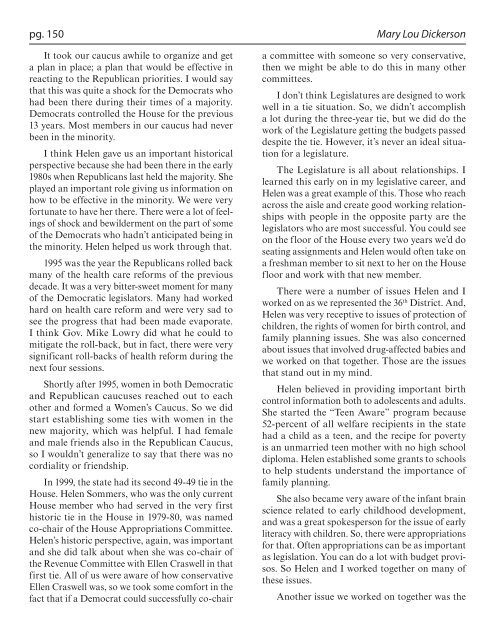Helen Sommers: An Oral History
Helen Sommers: An Oral History
Helen Sommers: An Oral History
You also want an ePaper? Increase the reach of your titles
YUMPU automatically turns print PDFs into web optimized ePapers that Google loves.
pg. 150 Mary Lou Dickerson<br />
It took our caucus awhile to organize and get<br />
a plan in place; a plan that would be effective in<br />
reacting to the Republican priorities. I would say<br />
that this was quite a shock for the Democrats who<br />
had been there during their times of a majority.<br />
Democrats controlled the House for the previous<br />
13 years. Most members in our caucus had never<br />
been in the minority.<br />
I think <strong>Helen</strong> gave us an important historical<br />
perspective because she had been there in the early<br />
1980s when Republicans last held the majority. She<br />
played an important role giving us information on<br />
how to be effective in the minority. We were very<br />
fortunate to have her there. There were a lot of feelings<br />
of shock and bewilderment on the part of some<br />
of the Democrats who hadn’t anticipated being in<br />
the minority. <strong>Helen</strong> helped us work through that.<br />
1995 was the year the Republicans rolled back<br />
many of the health care reforms of the previous<br />
decade. It was a very bitter-sweet moment for many<br />
of the Democratic legislators. Many had worked<br />
hard on health care reform and were very sad to<br />
see the progress that had been made evaporate.<br />
I think Gov. Mike Lowry did what he could to<br />
mitigate the roll-back, but in fact, there were very<br />
significant roll-backs of health reform during the<br />
next four sessions.<br />
Shortly after 1995, women in both Democratic<br />
and Republican caucuses reached out to each<br />
other and formed a Women’s Caucus. So we did<br />
start establishing some ties with women in the<br />
new majority, which was helpful. I had female<br />
and male friends also in the Republican Caucus,<br />
so I wouldn’t generalize to say that there was no<br />
cordiality or friendship.<br />
In 1999, the state had its second 49-49 tie in the<br />
House. <strong>Helen</strong> <strong>Sommers</strong>, who was the only current<br />
House member who had served in the very first<br />
historic tie in the House in 1979-80, was named<br />
co-chair of the House Appropriations Committee.<br />
<strong>Helen</strong>’s historic perspective, again, was important<br />
and she did talk about when she was co-chair of<br />
the Revenue Committee with Ellen Craswell in that<br />
first tie. All of us were aware of how conservative<br />
Ellen Craswell was, so we took some comfort in the<br />
fact that if a Democrat could successfully co-chair<br />
a committee with someone so very conservative,<br />
then we might be able to do this in many other<br />
committees.<br />
I don’t think Legislatures are designed to work<br />
well in a tie situation. So, we didn’t accomplish<br />
a lot during the three-year tie, but we did do the<br />
work of the Legislature getting the budgets passed<br />
despite the tie. However, it’s never an ideal situation<br />
for a legislature.<br />
The Legislature is all about relationships. I<br />
learned this early on in my legislative career, and<br />
<strong>Helen</strong> was a great example of this. Those who reach<br />
across the aisle and create good working relationships<br />
with people in the opposite party are the<br />
legislators who are most successful. You could see<br />
on the floor of the House every two years we’d do<br />
seating assignments and <strong>Helen</strong> would often take on<br />
a freshman member to sit next to her on the House<br />
floor and work with that new member.<br />
There were a number of issues <strong>Helen</strong> and I<br />
worked on as we represented the 36 th District. <strong>An</strong>d,<br />
<strong>Helen</strong> was very receptive to issues of protection of<br />
children, the rights of women for birth control, and<br />
family planning issues. She was also concerned<br />
about issues that involved drug-affected babies and<br />
we worked on that together. Those are the issues<br />
that stand out in my mind.<br />
<strong>Helen</strong> believed in providing important birth<br />
control information both to adolescents and adults.<br />
She started the “Teen Aware” program because<br />
52-percent of all welfare recipients in the state<br />
had a child as a teen, and the recipe for poverty<br />
is an unmarried teen mother with no high school<br />
diploma. <strong>Helen</strong> established some grants to schools<br />
to help students understand the importance of<br />
family planning.<br />
She also became very aware of the infant brain<br />
science related to early childhood development,<br />
and was a great spokesperson for the issue of early<br />
literacy with children. So, there were appropriations<br />
for that. Often appropriations can be as important<br />
as legislation. You can do a lot with budget provisos.<br />
So <strong>Helen</strong> and I worked together on many of<br />
these issues.<br />
<strong>An</strong>other issue we worked on together was the
















